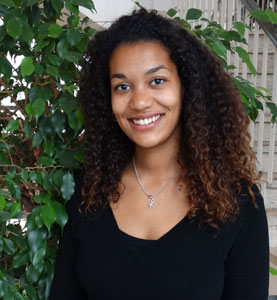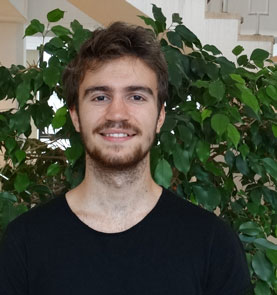Get to know the new Research Master students!
Tikam Sall (23) and Bernardo Tiberi (24) are two of our new students of the Research Master in African Studies. Curious about their background, their motivation to do African Studies, and their career expectations for the future? Read their personal stories to get to know them better!
Tikam Sall
 Can you tell us a bit about your background? And where does your interest in Africa come from?
Can you tell us a bit about your background? And where does your interest in Africa come from?
‘I went to school in Paris, where I had class in German and French. My father is from Senegal and my mother is German. On my 18th I went to Berlin to study Political Science at the Free University. I was always looking for an African angle to my studies, but that was quite difficult. There were courses about the BRICS countries, and I started to focus on South Africa. I wrote papers about the informal taxi industry, the on-going racial inequalities in post-apartheid society and affirmative action programs. In 2016 I took a semester off and did a volunteer project within a kindergarden and after-school programmes in Kleinkrantz, in the Western Cape. Living with the ‘Coloured’ community for seven months, inspired me to write my Bachelor thesis about the stigmatization of the ‘Coloured’ identity in post-apartheid South Africa. I got my BA at the end of 2017. In 2018, I did an internship at the Institute for Global Dialogue, also in South Africa. Here I published an article titled ‘The Rainbow Myth: Dreaming of a Post-racial South African Society’ – my first academic! – on the continuous racial inequalities in South Africa.’
What region in Africa would you like to focus on during your research master?
‘Well, I am Senegalese, and I think I have neglected my roots so far. I visited Senegal in the past for holidays, and this year before the Research Master started; I worked for an NGO: Ashinaga, that has bursary programs for orphan children, helping them to go to school or university. I also published an article on the Museum of Black Civilization in Dakar, questioning the restitution of African artifacts from European countries. I would like to continue in this path and do my research in Senegal, even though Southern Africa is still as well my area of interest.’
How do you see yourself in the future, doing what professionally?
‘I am interested in education, and how to decolonize education. What alternative programs or curricula are possible in education in Senegal? I would like to link my political interest with my passion for school teaching and children. And more importantly, I would like to participate in Senegalese society. I can see myself working there. I also liked the research I did in South Africa very much, so research also sounds attractive. I don’t think I will do one job anyways, so being able to work within research as much as within education or project managing is very important to me.’
Bernardo Tiberi
 Can you tell us a little bit about your background? And where does your interest in Africa come from?
Can you tell us a little bit about your background? And where does your interest in Africa come from?
‘I grew up in the south of Italy. My interest in Africa started in primary school: my best friend came from Senegal. He came to our class when I was ten, and sat next to me. His dad had come to Italy in the 80s to find work in Europe, the rest of his family came later. We are still best friends, he now lives in Maastricht, and we speak a lot about Senegal. I went to Dakar for the first time in 2017. This was part of my studies Social and Cultural Anthropology in Madrid. I got my BA in 2018. The focus of this study programme was more on Latin America, but I read a lot about Africa. There are so many things to discover about Africa, and we know so little about it - while it is so close to us, especially seen from Italy.’
What region in Africa would you like to focus on during your research master?
‘I am still very much interested in the western region, Senegal in particular. But here in Leiden, I also got interested in Ethiopia, a region in transition. So I started reading about the history, and started to read Italian scholars. It’s a confluence of cultures from the Arabic world, Israel, the Greek and Latin world, and other African cultures.
I am particularly interested in history, ancient history; but now for my studies I am also reading about current politics and e.g. land dynamics, which also fascinate me.’
How do you see yourself in the future, doing what professionally?
‘In a perfect world I would like to stick to research. If that doesn’t work out, I would like to work for international organizations. For example immigration organizations; there is a real need there. Politicians and economists deal with immigration in not very accurate ways, to put it politely!’

